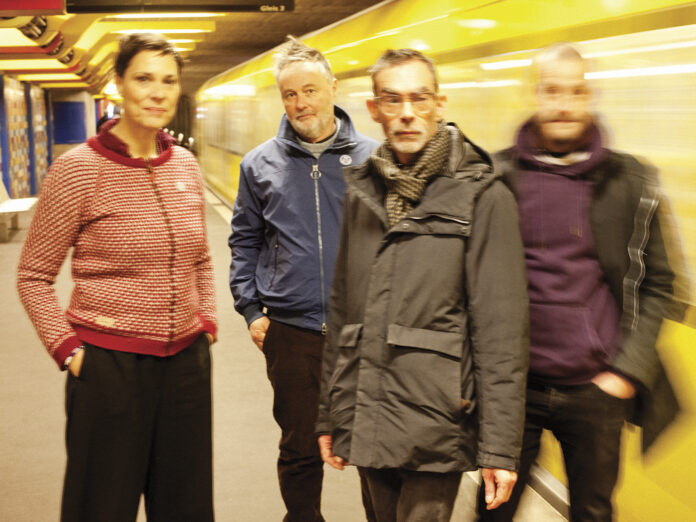It begins with 56 seconds of sequencers going haywire, a warning siren from the heart of the cosmos. Then, after a few ominous organ chords, a wise and familiar voice emanates from the speakers. “The numbing is not working any more,” intones Laetitia Sadier, articulating the current sense that everything has ceased to function – even the drugs designed to keep us distracted and supine. “Thirsty is the fear of death… We can’t drink our way out of it.” By this point in the song – entitled “Aerial Troubles” – a typically irresistible yé-yé groove has kicked in and the moribund state of our society in 2025 feels like something to be solved rather than lamented.
It begins with 56 seconds of sequencers going haywire, a warning siren from the heart of the cosmos. Then, after a few ominous organ chords, a wise and familiar voice emanates from the speakers. “The numbing is not working any more,” intones Laetitia Sadier, articulating the current sense that everything has ceased to function – even the drugs designed to keep us distracted and supine. “Thirsty is the fear of death… We can’t drink our way out of it.” By this point in the song – entitled “Aerial Troubles” – a typically irresistible yé-yé groove has kicked in and the moribund state of our society in 2025 feels like something to be solved rather than lamented.
THE JULY 2025 ISSUE OF UNCUT IS AVAILABLE TO ORDER NOW: STARRING NICK DRAKE, A 15-TRACK NEW MUSIC CD, THE WHO, BLACK SABBATH, BRIAN ENO, MATT BERNINGER, PULP, BOB WEIR AND MORE
Stereolab have always been a political band. Back in 1994, “Ping Pong” came close to smuggling a scathing critique of boom-and-bust economics into the Top 40. “French Disko” was an empowering resistance anthem, declaring that “Acts of rebellious solidarity/Can bring sense in this world”. Even Dots And Loops’ “Refractions In The Plastic Pulse”, the dreamy centrepiece of their recent live shows, drew on the libertarian socialist philosophy of Cornélius Castoriadis to insist that alternative futures are possible. Sometimes it feels as though this aspect of the Stereolab oeuvre is overlooked – or at least treated rather patronisingly as another one of their adorable quirks, alongside the French accents and the fetishisation of outmoded technology. But at a time when neo-fascism is on the rise across Europe, and when even a Labour government is slashing welfare budgets to boost defence spending, Instant Holograms On Metal Film pushes back forcefully against this grim tide with a vital blast of agit-pop.
Not that you would necessarily deduce this at first sight. Often when bands return to the fray after a long hiatus, they opt to play it safe and give the fans what they think they want, becoming caricatures of themselves in the process. The initial fear here is that Stereolab might have done the same thing. The artwork – by Vanina Schmitt, sleeve designer of the last two Switched On compilations – gives nothing away except to say: yes, this really is a Stereolab album. The title is self-referential in the extreme, as if created by cutting up and reassembling the names of previous Stereolab records. Despite the decade-and-a-half gap between albums, they seem to be at pains to suggest that this is very much business as usual. Which, in a way, it is: the business of being a completely unique, extraordinary band.
The miracle of Stereolab is that their music never grows old. Since reforming in 2019, they have released expanded editions of most of their best-loved albums, as well as five bulging editions of their Switched On compilation series, without any fear of listener fatigue. Perhaps it’s their unique combination of pop sensibility and avant-garde experimentation, the tireless quest for undiscovered chords and novel permutations of sounds, but however much you listen to Stereolab, their music always sounds fresh, crisp, deliciously moreish. Instant Holograms… is no exception, each song instantly identifiable as Stereolab while bringing something new to the table – and often metamorphosing into a completely different song halfway through. Motifs are rapidly transferred from one instrument to the next, creating a pleasingly mesmeric effect, like a kaleidoscope in constant rotation.

Naturally, the gear list includes a staggering array of vintage synthesisers and other keyboard instruments – from the Vox Jaguar and the Moog Matriarch to the obscure East German organ namechecked in the title of “Vermona F Transistor” – most of which are played by the band’s resident boffin, Joe Watson (you don’t have to have written a PhD thesis in transduction and performativity to work here, but it helps). Woven into this rich tapestry are a variety of more acoustic textures, some of which are new to these parts. Stereolab have used brass before – Sadier herself wields a mean trombone – but it’s never been played with quite the same intensity as Bitchin Bajas’ Rob Frye and fellow Chicago avant-jazz head Ben LaMar Gay offer here. Frye’s wonderfully visceral saxophone break towards the end of the epic “Melodie Is A Wound” sounds like it’s literally ripping open the music’s shiny electronic veneer to expose the raw human flesh beneath.
That song is immediately followed by the unusually folky and introspective “Immortal Hands”, driven by a proggy, harpsichord-style figure and the purposeful strum of Tim Gane’s 12-string acoustic guitar. It’s momentarily reminiscent of Fleetwood Mac’s “Rhiannon” with added marimba. Then suddenly a drum machine sputters into life, taking the song to another dimension, before it ends with peals of warm brass and bucolic flute. There are similarly reflective moments secreted throughout the album, even if a rasping Roobarb & Custard riff is never too far away.
The vocal arrangements are equally inventive. While the band could never hope to replace the late Mary Hansen, whose voice intertwined so naturally with Sadier’s, the staggered multi-part harmonies of “Le Coeur Et La Force” are constructed with the delicacy of a matchstick Versailles, with Frye’s twin saxophones adding further layers of bliss. There is so much to enjoy about this constantly shimmering tableau of sounds that it would be easy to think of Sadier’s vocals as just another instrument. But her lyrics confront the horrors of the 21st century head-on.
Take “Colour Television”. You might assume from the title that it’s a jolly piece of retro-futuristic fluff, a knowing callback to a time when the cathode ray tube felt the portal to a new world. But in fact the song is a pithy, withering takedown of the kind of bogus aspirational narrative now spouted by politicians of all stripes – “a deluding promise of a middle class for all” – that allows the rich to continue to divide and rule. “It’s a single story/Violently imposed as the/Universal narrative/Of progress and development and of civilisation,” trills Sadier, over pleasantly chuntering systems music. But if that makes said narrative sound ingrained and hopeless, in Stereolab’s world, a happy ending can always be glimpsed, if we want it: “Open are the possibilities!”
“Melodie Is A Wound” tackles an even more sinister reality in the form of creeping authoritarianism. “The goal is to manipulate/Heavy hands to intimidate,” sings Sadier, calmly explaining how Trumpian tactics “Snuff out the very idea of clarity/Strangle your longing for truth and trust”. It reads like a lyric to be snarled over serrated post-punk guitars and apocalyptic kick-drum thuds. But naturally it’s a breezy slice of Bacharach-style pop with an extended, accelerating coda.
Sadier comes armed with solutions, too. “Explore without fear the rhizomic maze,” she instructs, towards the end of the album. “Wisdom, faith, courage are necessary.” And if it still occasionally sounds like she’s reciting situationist pamphlets, there’s a more relatable, healing aspect to “Esemplastic Creeping Eruption”, which invites you to explore your “inner world” to “restore completeness” as a frisky rhythm periodically dissolves into vibraphonic bliss, “the place where dark and light touch”.
“Transmuted Matter”, meanwhile, draws on The Path Of The Rose, a spiritual teaching attributed to Mary Magdalene, to assert that paradise is within our grasp, if we are prepared to give ourselves over to love. “Fully human fully divine, entwined,” sings Sadier, enraptured. “Tell me what do you see through the eye of the heart?”
In a world where startling numbers of people seem to have lost faith in themselves and humanity as a whole, turning instead to destructive political nihilism, Instant Holograms… offers a kind of manual on how to resist the negativity and reconnect with society. Alternatively, it’s another super-fun Stereolab album full of obscure synth blurps, nifty lounge-pop tunes and gnarly motorik wig-outs. Either way, you won’t be disappointed.
When you purchase through links on our site, we may earn an affiliate commission. Here’s how it works.



